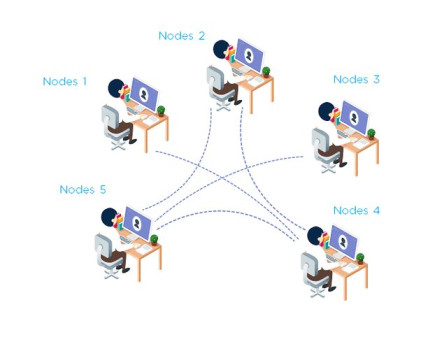
What are blockchain node providers and how they really work?
As per the P2P or Peer-to-Peer technology, the blockchain is called the distributed ledger technology that allows the data to get stored globally on the servers with any network user that can see all the entries that appear at that given time. In this case, the blockchain provides transparent transactions for different companies that include the ability to make secure networks and also real-time communications with the assigned partners globally.
We all know that the process of installing and setting up nodes is quite time-consuming and hard, which has called up for the node providers. The companies that provide this type of service to start-ups use blockchain nodes for better management. The blockchain providers provide different nodes to the companies and even to the individual developers as tools that will further help build a decentralized application so that they do not have to spend their quality time maintaining and managing the nodes by themselves.
GET BLOCK is one of the best companies that provide superior node infrastructure for building dApps. The developer tools and insights guarantee simple API access to different blockchains like Ethereum, Bitcoin, etc. Therefore, choosing this platform has various benefits for getting blockchain nodes.
- Provide you with fast assistance – The best part of choosing the nodes from GET BLOCK is that it has fast personal consulting for beginners and experienced users.
- Customized SLAs- The platform also provides fully featured SLAs that are based on the project performance and business model
- Providing helpful Docs- For the benefit of the users, the team also provides technical guides, endpoints, API references and many more. You can avail of the services from GetBlock.io.
What Do You Understand by Nodes and Masternodes?
The nodes and master nodes are gaining importance these days and also in the field of the blockchain sector. As the nodes are too critical in the blockchain infrastructure, it has become one of the important parts that should not be neglected. Without the nodes, the data in the blockchain will not be able to be accessed in the right way. You can say that nodes are blockchains.
What Is The Infrastructure Of Blockchain Nodes?
The blockchain is made from the blocks of data. These blocks of data are then stored on the nodes. They can be of any device, like computers, laptops or even larger devices. Nodes generally form the infrastructure of the primary blockchain. All the nodes are then connected, and they exchange the latest data with each other. Their main function is to store, preserve and spread the data. The full node is the device that contains all the full copies of the transaction history of the blockchain.
What are the functions of nodes?
When someone wants to add a new block of transactions to the blockchain, it will broadcast the block to different nodes on the network. Depending upon the authenticity of the block, the nodes will accept or reject the blocks. When the node accepts the new block of the transaction, it will save and store it on the top of other blocks that already store the data. The functions of nodes are-
- Nodes check the block of transactions is valid or not
- Nodes save and store the blocks of transactions
- Nodes broadcast and distribute the transaction history to other nodes
Apart from these, there are some blockchains having master nodes. They are mainly equipped with heavier features than the normal nodes. They are mainly online 24 hours and also facilitate more memory than normal nodes. Want to get shared nodes or dedicated nodes? Visit the website of GET BLOCK and choose your plans now.